Kendall College of Art and Design
(800) 676-2787
17 Fountain St. NW,
Grand Rapids, MI 49503
Where others see a problem of mounting plastic waste in West Michigan, two alumni from Ferris State University’s Kendall College of Art and Design see an opportunity to solve the problem through design.
During a trip to Bali, Jared Seifert and Lauren Copping were inspired by community efforts to capture plastic waste and transform it into something new. After returning home, they combined their skills to launch Design Declassified, turning locally sourced plastic waste into beautiful, durable sheet materials.
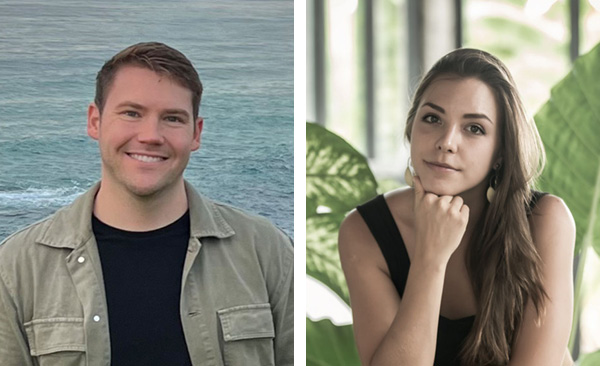 KCAD alumni Jared Seifert (left) and Lauren Copping (right)
KCAD alumni Jared Seifert (left) and Lauren Copping (right)
The duo chose to focus on readily available post-consumer and industrial waste, turning it into 100% recycled sheets (with no added glues, resins, or colors) that can be used in applications ranging from countertops to furniture, lighting, and home goods.
“Sustainability has always been a passion of ours, and this seemed like an incredible opportunity to take our knowledge back to West Michigan,” said Seifert, who graduated from the KCAD Industrial Design program in 2018. Copping is a 2018 graduate of the Interior Design program.
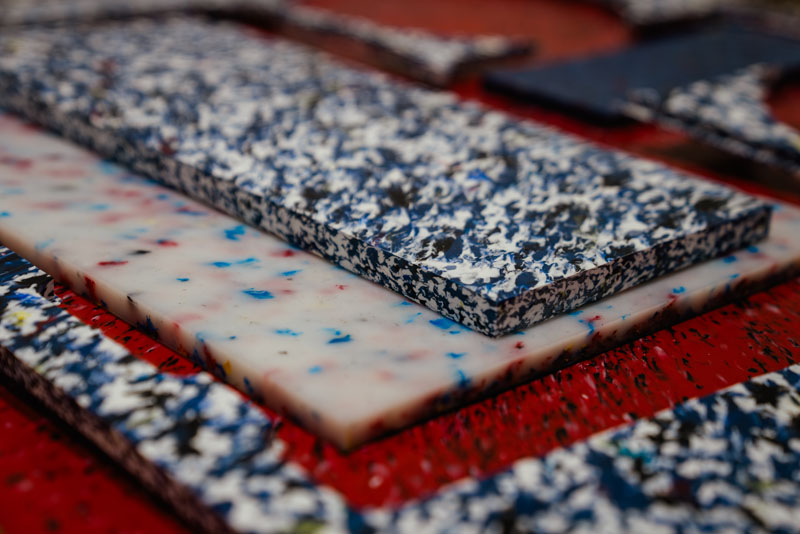 Design Declassified's proprietary material made entirely from recycled plastic
Design Declassified's proprietary material made entirely from recycled plastic
Design Declassified’s entire business cycle is currently on display in the Fragments to Form exhibition at the KCAD FLEXgallery. In this non-traditional space—developed by Exhibitions Director Michele Bosak to showcase the process of creativity rather than only focusing on the product—Seifert and Copping can give viewers a unique window into every step that led their sustainable business to where it is today.
“FLEXgallery embraces the dynamic nature of the creative process, and that’s opened up a whole new world of possibilities for how audiences can interact with the work on display,” said Bosak. “Visitors to Fragments to Form can see not just the prototypes of lighting, drawer fronts, desks, and furniture Design Declassified is making, but also how the reclaimed plastic they’re using evolves from empty containers to shredded fibers to the finished sheets that retain the colors and translucency of the original materials. It invites you to envision the full potential of the material.”
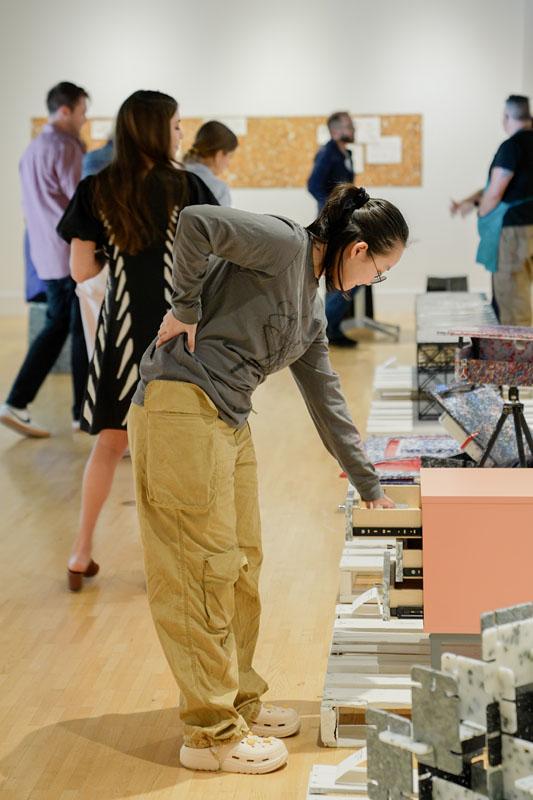
(above and below): the Fragments to Form exhibition inside the KCAD FLEXgallery
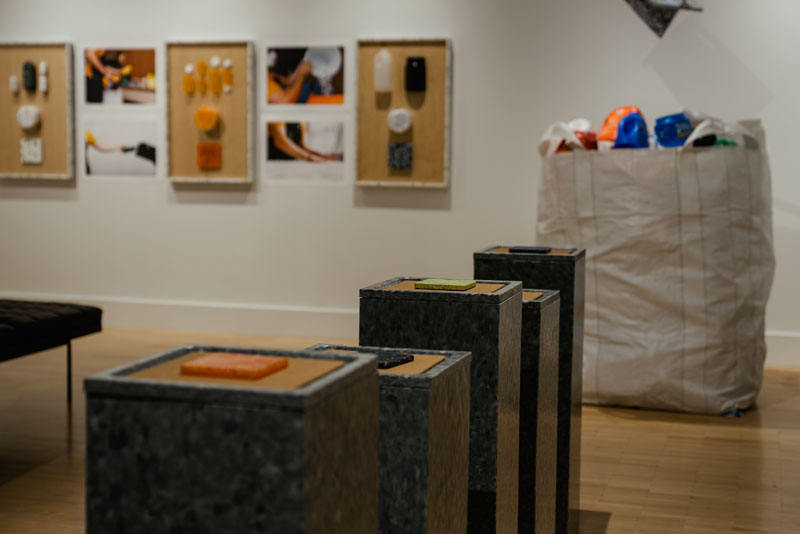
Design Declassified sources its plastics through the Rockford Sustainability Committee, which accepts clean recyclables from the community. They use high-density polyethylene (HDPE) milk jugs and detergent bottles, low-density polyethylene (LDPE) from bags, and polypropylene (PP) from pill containers, food packaging, yogurt cups, and automotive parts.
Seifert and Copping have also partnered with local recyclers and compounders that capture waste streams at the shredded and washed phase, which cuts down on the chemicals and greenhouse gases emissions involved with processing and pelletizing the plastic.
The shredded plastic is then molded into 36” x 36” sheets with a terrazzo- or marble-like finish, which they sell to manufacturers. With performance characteristics like durability, chemical and corrosion resistance, UV resistance, food safety, water resistance, and easy fabrication with standard woodworking equipment, the material is versatile enough to be used for surfaces, wall tiles, products and furniture designs.
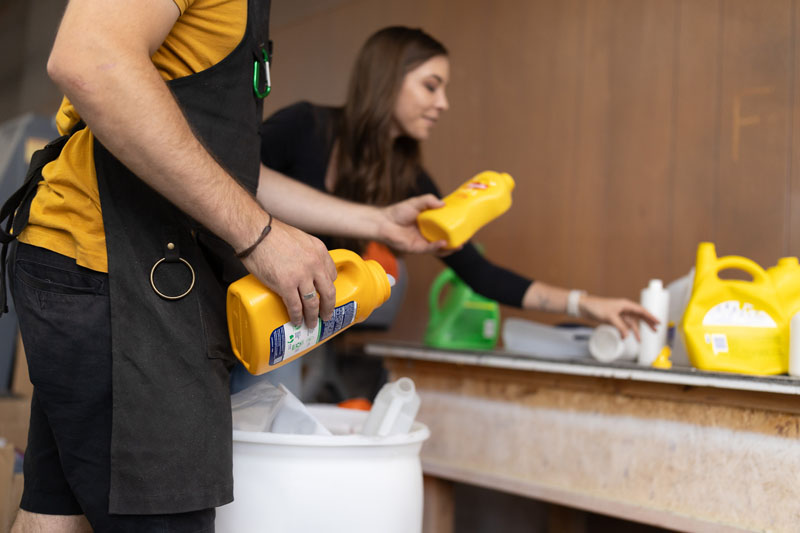
(above and below): Jared Seifert and Lauren Copping of Design Declassified sorting and processing plastic waste (images courtesy of Design Declassified)
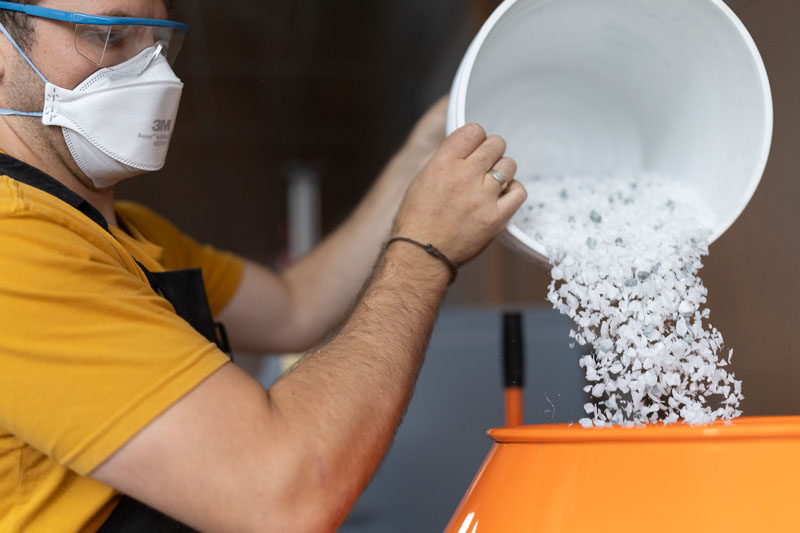
Copping brings a unique lens to the collaboration through her business Mont Design, which works with vacation rental and property investors across the United States and Bali to designing guest-centered spaces that feature sustainably source materials and non-toxic finishes. That experience understanding the appeal of sustainable products to both producers and consumers has been instrumental in shaping Design Declassified.
For Fragments to Form, Copping created the experience, layout, and designed the plastic features and millwork featured throughout the space, while Seifert produced all the materials and hand-crafted the features and millwork. The exhibition also showcases a collection of other innovative sustainable design materials that Copping curated.
“We relied on Jared's knowledge of typical thicknesses and materials for making furniture, along with my knowledge of interior finishes, to create a product that would be in demand,” said Copping.
Early on, the pair teamed with Metro Engineering, which provided equipment and a space to develop prototypes. Recently, they procured their own equipment, fine-tuning it to achieve the tolerance specs they needed to deliver high-quality products.
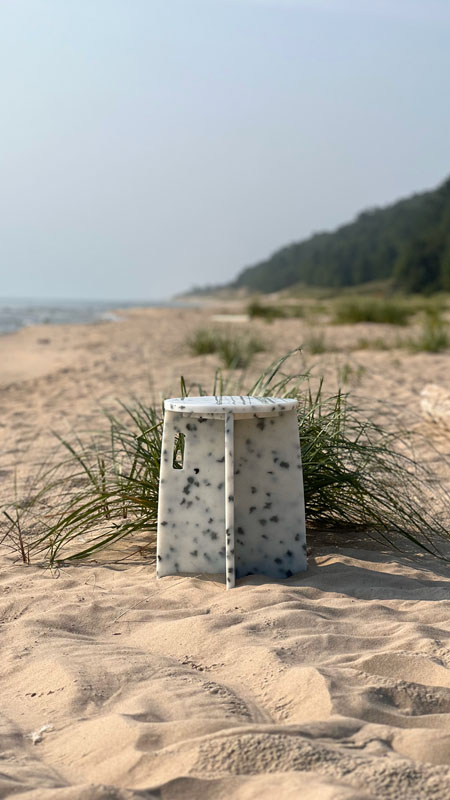 The Mint Stool, one of the furniture products created by Design Declassified from
plastic waste (image courtesy of Design Declassified)
The Mint Stool, one of the furniture products created by Design Declassified from
plastic waste (image courtesy of Design Declassified)
They also credit their education at KCAD for helping them get the business off the ground.
“I was fortunate to have supportive professors and an education system that encouraged entrepreneurship,” said Seifert. “Along with learning how to become an industrial designer, I learned how to create a pitch deck, write a business plan, and figure out where to go for funding.”
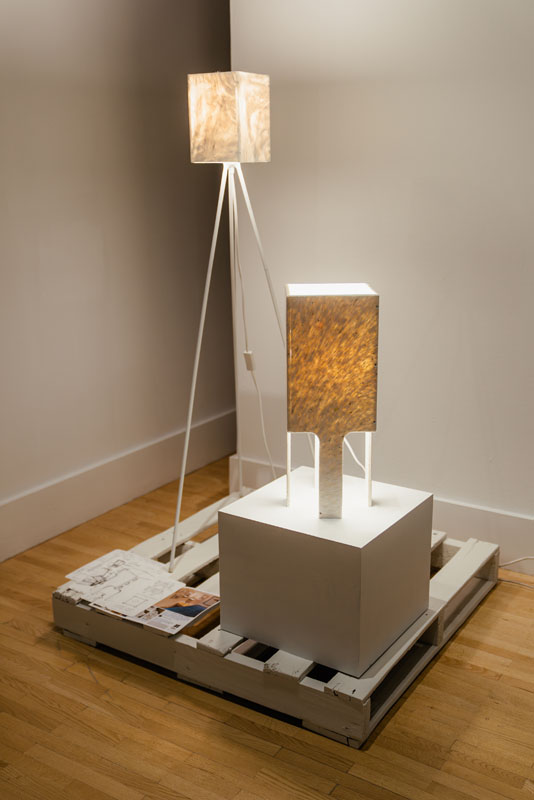 Prototype lighting fixture created by Design Declassified using recycled plastic,
on display in the Fragments to Form exhibition at KCAD
Prototype lighting fixture created by Design Declassified using recycled plastic,
on display in the Fragments to Form exhibition at KCAD
Just a year after launching, Design Declassified is already garnering recognition, earning $10,000 of in-kind technical support through the NextCycle Michigan Accelerator, which supports entrepreneurs working to launch businesses focused on reuse, recycling, composting, and recycled-content projects. The accelerator’s overarching goal is to fuel the development of a circular economy, an economic system in which materials never become waste and nature is regenerated.
The circular economy is a proposed transition from our current linear model, in which we take finite resource stocks, make things out of them, and then dispose of those things when we no longer have use for them.
In the circular economy, products and materials are kept in circulation through an intentional focus on maintenance, reuse, refurbishment, remanufacture, recycling, and composting. The system also provides a new framework for tackling thorny global challenges like climate, biodiversity loss, waste, and pollution by separating economic activity and growth from the consumption of finite resources.
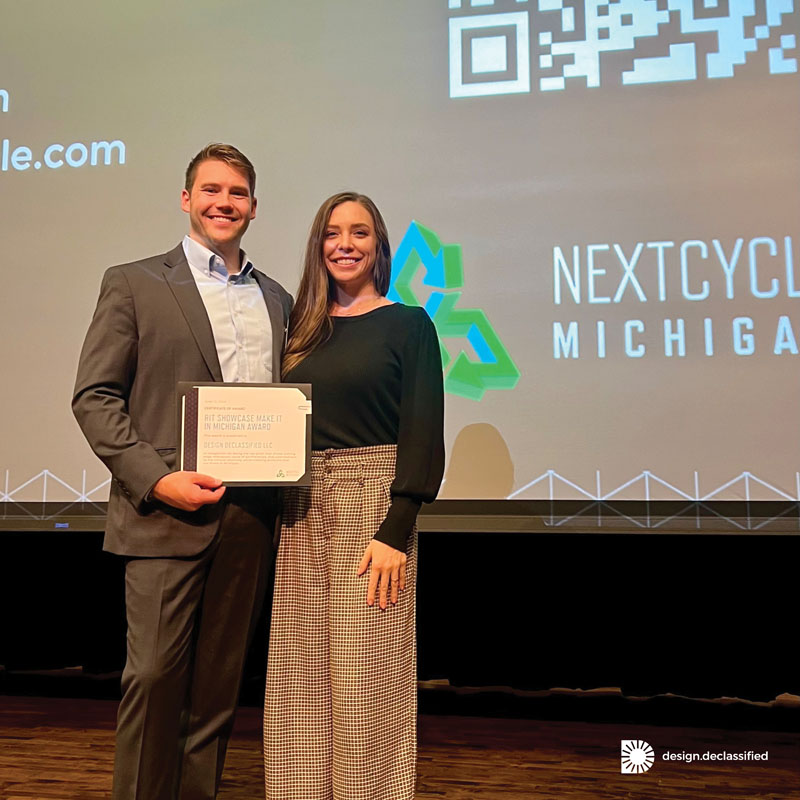 Seifert and Copping at the 2024 NextCycle Michigan Accelerator awards event (image
courtesy of Design Declassified)
Seifert and Copping at the 2024 NextCycle Michigan Accelerator awards event (image
courtesy of Design Declassified)
Initiatives like NextCycle Michigan and the circular economy-focused Wege Prize international student design competition, organized by KCAD with support from the Wege Foundation, are aiming to make the state a launchpad for building the economy of the future.
“Succeeding in NextCycle was an incredible accomplishment which enabled us to further our growth and connect with other accelerator programs,” said Seifert. “It’s such a valuable program to advance innovative and sustainable business practices and provide essential resources and support.”
Copping invites anyone interested in design or sustainable entrepreneurship to visit Fragments to Form in the FLEXgallery throughout the fall semester at KCAD.
“This space isn’t about our work being held up on a pedestal, but more about giving people a window into what our past year has been like,” she said. “We’re responding to the doom and gloom about plastic waste with a positive spin about what other people around the world are doing that inspires us, and what we’re going to do in West Michigan.”
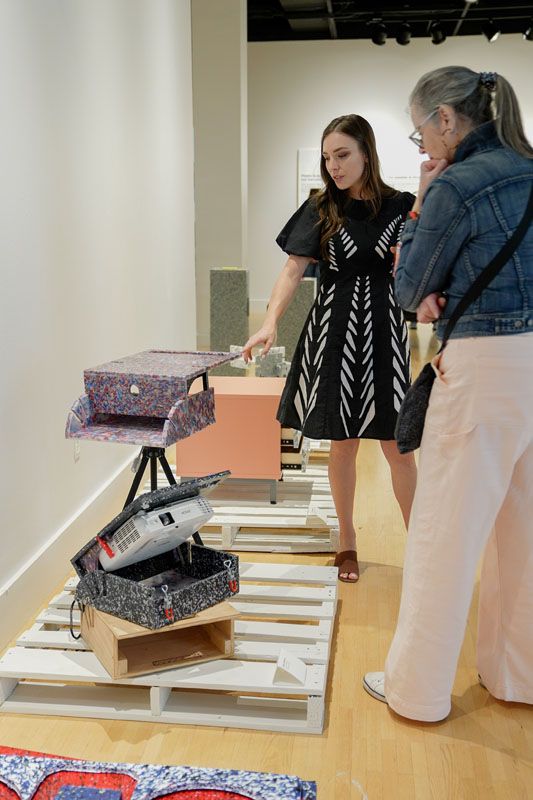 Copping showing off Design Declassified prototypes during an open house event for
the Fragments to Form exhibition
Copping showing off Design Declassified prototypes during an open house event for
the Fragments to Form exhibition
Copping and Seifert have also included a space for people to sketch their own products and interiors and pin them up on the wall.
“We’re ready to share and have people give us some fresh perspectives on how they can imagine our product being used,” said Copping. “Come share your thoughts. We need other people's ideas and enthusiasm to keep us going!”
Visit Fragments to Form at the KCAD FLEXgallery, located on the first floor of the Woodbridge N. Ferris Building at 17 Pearl St. NW, now through November 23, 2024.